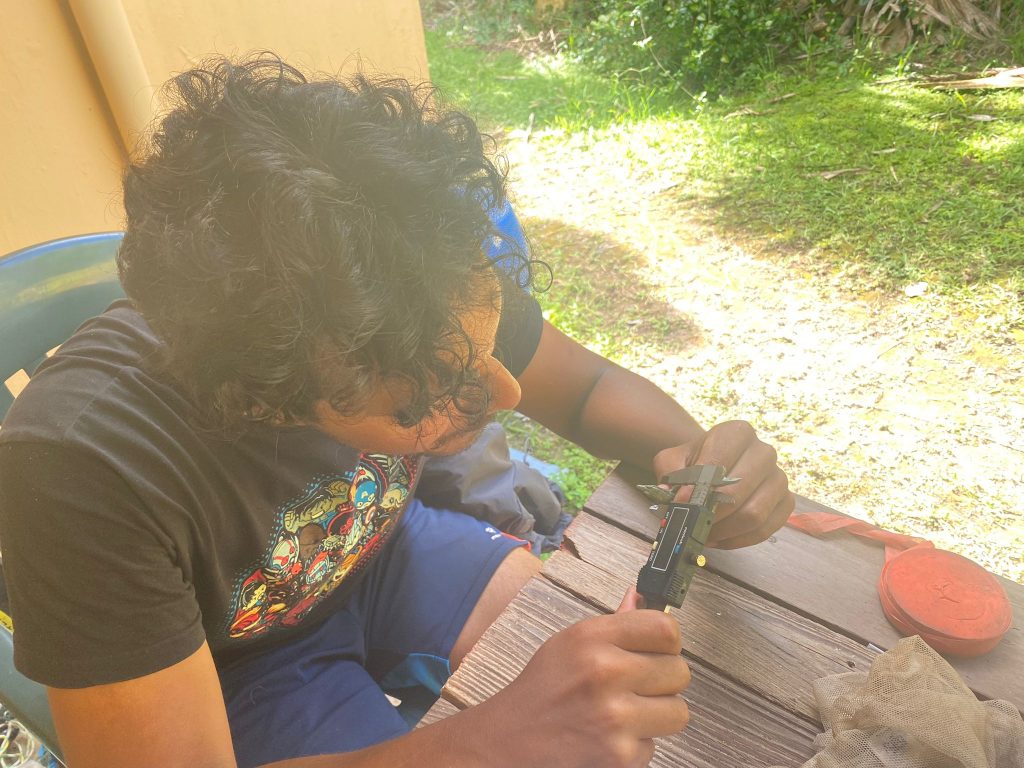
Arriving in Bermuda and seeing my accommodation for the next three months, I began to wonder what I had let myself in for. I first felt trepidation; leaking roofs, a leaking boat, and unreliable amenities (for example, no running water) left something to be desired. However, I soon discovered that the Bermudian people more than made up for any accommodation issues with their friendliness and helpfulness. Also, thanks to Manchester Met Graduate School’s Research Support Award, I was joined by my field assistant Hans, so I soon had company. More importantly, Hans enabled me to expand the scope of my study dramatically.
To give you a bit of background, I began my PhD at Manchester Met in January 2023. I am studying the population genetics of the Critically Endangered Bermuda skink. This lizard is endemic to Bermuda, meaning it lives here and nowhere else in the world. In fact, it is the only endemic terrestrial vertebrate species found on Bermuda, but here it has been forced to the fringes of its historical range and is now only found in a few coastal spots and scattered islands. It has been driven to this point by urban development, invasive predatory species, and littering. As a result, and as has been seen in many endemic island species, the number of wild skinks has declined dramatically over the past century.
Declining numbers and the fragmentation of populations present the skink with the threat of extinction. In an effort to conserve this species, Chester Zoo, in collaboration with the Government of Bermuda, began a breeding programme in 2013. A decade later they have now begun reintroducing them into the wild, which is where I come in.

Along with my frankly fantastic supervisory team, I am studying the skinks’ population genetics. This will enable us to expand the scope of their reintroduction and potential translocation. Currently, reintroducing skinks only happens at one site. There are two main reasons why this has not yet been rolled out more widely: the possibility of unintended negative impacts on the existing scattered populations of skinks, and a lack of knowledge on the species (the skinks are heavily understudied as surveying them takes extensive effort). Scattered populations lead to genetic isolation, and each persisting population could be genetically distinct enough that the introduction of skinks from another site would increase genetic challenges. For example, this might include introducing genes that result in physical attributes or behaviours which aren’t suited to the site individuals are moved to. This is known as maladaptation. That we currently know little about the skinks means we have limited knowledge on their overall behaviour and life history, as well as their genetic diversity. This limits potential to reintroduce them as without knowing site suitability we risk reduced chance of success or even negative impacts. Therefore, I will tackle the lack of knowledge on their genetics to inform relocation efforts and avoid causing genetic problems.
I first needed to obtain DNA samples. If I were alone, I would process a small number of skinks each day, meaning I could survey only a few sites. However, with Hans to assist, we greatly increased our coverage, surveying ten sites across Bermuda, including small islands and isolated mainland sites – using our previously mentioned leaky boat. As a result, we will be able to provide a better overview of the population genetics and genetic diversity of Bermuda skink. This means that we will have a much better idea of where the skinks are struggling, and how best we can manage their populations to help them survive, despite the pressures they are under. Needless to say, the Research Support Award has been invaluable in enabling this to happen and I am sure that, like me, the skinks are grateful too.
Photo credit for featured image: Chester Zoo.


